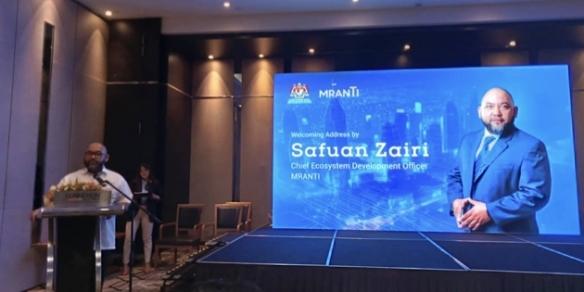Banking on the hybrid multicloud
By Azrin Abd Shukor May 14, 2020
- Driving the technological future of financial services in Malaysia
- A multitude of solutions & infra will allow financial companies avoid vendor lock

 The banking and financial services revolution of the past decade has been fueled by the rapid shifts in consumer preferences when accessing financial services. This is particularly the case in the developing economies of Southeast Asia. According to McKinsey & Co, smartphone banking penetration has jumped two- to four-fold in many emerging Asian markets between 2014 to 2018.
The banking and financial services revolution of the past decade has been fueled by the rapid shifts in consumer preferences when accessing financial services. This is particularly the case in the developing economies of Southeast Asia. According to McKinsey & Co, smartphone banking penetration has jumped two- to four-fold in many emerging Asian markets between 2014 to 2018.
Such growth can be attributed to a wide range of services aimed at banking the unbanked in the region. In 2017, Singapore’s DBS Bank set up Digibank, a mobile-only bank that operates branchless, paperless and signatureless in Indonesia and India. Malaysian-based MOLPay, on the other hand introduced MOLPay Cash, which allows users to shop online and select to pay in cash at any 7-Eleven outlet across the country, with no bank cards or accounts involved.
These new services have one thing in common; they are built around harnessing the power of data. From data that shows trends in consumer preference and digital adoption to information that depicts the utilisation and success of every financial products, services and platforms, the financial sector is realising the immense potential of data to their businesses.
As customer and financial data is the lifeblood of all financial institutions, adopting a hybrid multi cloud approach that offers a mix of public cloud flexibility and private cloud security are a necessary tool to leverage on and optimise such data. Beyond that, NetApp has identified the following benefits of hybrid multi-cloud that could be a game changer for Malaysia’s financial services sector.
Optimising costs, data movements and workloads
Banks can’t necessarily predict what new services customers will demand, or, more importantly, when they will demand them. For example, banks that are only using on-premise storage and data management solutions may risk exhausting their servers, slowing down customer interactions and ultimately hurting the overall brand experience, if a critical mass of banking customers were to log onto the site at the same time.
With hybrid multicloud, financial institutions can scale up and down as needed, providing both instant and long-term flexibility that enables them to adapt and move with constantly changing conditions. Beyond that, hybrid multicloud can help optimise technology investments, moving away from heavy up-front capital spending towards a pay-as-you-go, operational based models. As a result, financial companies can respond more quickly to market shifts or changes in financial priorities; increasing or decreasing computing capacity as needed and facilitating granular spending control.
Enhancing security, governance, and resilience
As a part of a heavily regulated industry, banks and financial institutions need to orchestrate their move to hybrid cloud carefully in order to address security, data privacy, and regulatory compliance requirements.
With hybrid cloud, financial services players are able to tap on the security tools that are native to each cloud provider’s environment, enjoying shared security responsibility to anticipate and prepare for security risks. Furthermore, security threats change constantly, and hybrid cloud gives banks access to tools like AI that will be critical to identifying and addressing cybersecurity threats faster.
Cloud computing can also help banks and financial services firms meet ever-evolving regulatory reporting requirements in multiple operating jurisdictions—a critically important capability in an industry where cross-border transactions are the norm. Banks can conduct intraday liquidity and risk calculations, and mine trade surveillance data to detect anti-money laundering and other fraud issues.
With hybrid multicloud, financial institutions will enjoy greater data protection, data privacy, business continuity, and disaster recovery. Adopting a multitude of solutions and infrastructure from on-premise, private and public cloud will allow financial companies to avoid vendor lock-in and introduce additional layers of complexity to managing their digital assets. Beyond that, it will enhance companies’ overall resilience to respond more quickly to physical outages and disruption by gaining the ability to replicate data and app services across more than a single data center or region.
Nevertheless, it is important to note that there is no ‘one-size-fits-all’ approach to meeting the diverse needs of cloud computing in financial services. The goal for finance companies is to take advantage of hybrid infrastructures, virtual private clouds, and managed services geared specifically to the finance sector. They also need to leverage containerisation and a growing professional services ecosystem that helps financial institutions implement and manage tailored cloud solutions.
As a data authority for hybrid cloud, NetApp has the breadth of solutions to help financial services organisations manage the complexities of a hybrid multicloud environment. These include operating systems that ensures data control, cost efficiency and business continuity; Software-as-a-Service (SaaS) solutions for data back and up and recovery, insights and analytics platforms that support business and operational planning and much more.
No doubt, Malaysian financial institutions are ready to move towards a more immersive hybrid multicloud environment. A recent study by the Cloud Security Alliance (CSA), found that 64.7% of the country’s financial services companies are developing a cloud strategy. This, coupled with efforts by Bank Negara Malaysia to develop a regulatory framework which includes the use of cloud and datacentre by financial institutions, will place our financial organizations in great stead to lead the way in the region, towards becoming the banks of the future, with hybrid multicloud at the core.
Azrin Abd Shukor is Country Manager of Malaysia, Brunei & Philippines, NetApp


